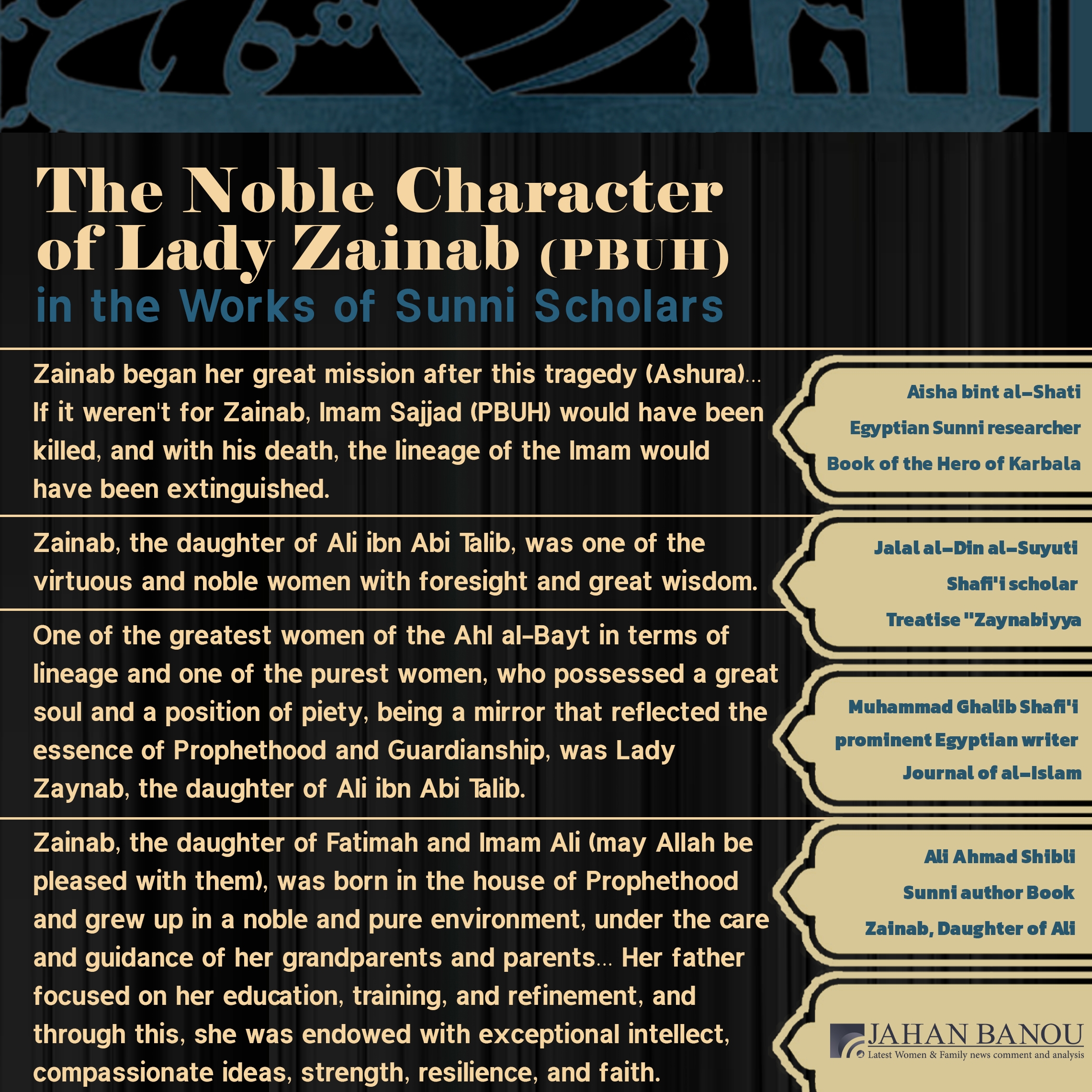Many women consider Lady Zaynab (peace be upon her) as a model for political and social activism. However, this time, let’s draw inspiration from her modest and virtuous life.
Lady Zaynab as an Exemplary Role Model
Lady Zaynab (peace be upon her) is a unique and legendary figure who developed in every aspect of her existence. During the tragic events of Karbala, only certain qualities of hers, such as insight, patience, sacrifice, piety, and devotion to the cause of the family of the Prophet (peace be upon him), became apparent.
However, aspects of her personality, such as her role as a wife, a mother, and her political and social activism, are less discussed. One of the most consistent aspects of her life that she always focused on was her modesty and her commitment to the veiling and modesty of women.
Modesty in Lady Zaynab’s Life
In historical records, it is narrated: “When Zaynab (peace be upon her) intended to go to the Mosque of the Prophet (peace be upon him), Ali (peace be upon him) would instruct her to go at night. He would send Imam Hasan (peace be upon him) and Imam Hossein (peace be upon him) to accompany her—Imam Hasan (peace be upon him) would walk ahead, and Imam Hossein (peace be upon him) would walk behind her, while Lady Zaynab walked in the middle. They were ordered to even extinguish the light on the Prophet’s (peace be upon him) grave so that no stranger would gaze upon her.”
Yahya Mazani says: “I was a neighbor of Imam Ali (peace be upon him) in Medina for a long time. By God, I never saw Lady Zaynab (peace be upon her), nor did I ever hear her voice.“

Her Speech in Kufa
When the captives arrived in Kufa, Lady Zaynab delivered a speech that astonished the enemies of the Ahl al-Bayt. One of the enemies remarked: “I saw Zaynab, the daughter of Ali (peace be upon him), and I have never seen a more modest and eloquent woman. It seemed as though she was speaking the words of Amir al-Mu’minin (peace be upon him).”
Her Critique of Yazid’s Injustice
When Lady Zaynab (peace be upon her) arrived in the court of Yazid, her main complaint was not the martyrdom of her brothers or their captivity but rather the issue of modesty and the exposure of the women of the Prophet’s family in front of strangers.
She said: “O son of the freedmen! Is this justice, that you veil your own women and maidservants, but expose the daughters of the Messenger of God (peace be upon him) as captives in front of strangers? You hide your women and maidservants behind a veil, but you make the daughters of the Messenger of God parade before enemies, from one city to another, where both the lowly and the noble, the close and the distant, gaze upon them, while they have no male guardians or protectors?“
From this, we learn that Lady Zaynab considered death for the sake of God as beauty and presence before strangers as disgrace and humiliation.
A Unique Example of Modesty
The late Allama Mamqani writes that Lady Zaynab was unparalleled in her veiling and modesty. No man had seen her from the time of her father and brothers until the day of Ashura. A narration tells us that Lady Zaynab, while riding a camel without a proper covering, addressed the people of Kufa, saying: “O people, cover your eyes! Do you not feel shame before God and His Messenger that you look upon the women and family of the Prophet (peace be upon him) while they are uncovered?” (Despite the fact that these women were not without a veil.)
A Direct Saying of Lady Zaynab
In a narration from Lady Zaynab (peace be upon her) herself, it is reported: “It is better for women that they do not see men, nor should men see them.” (Bihar al-Anwar, vol. 43, p. 54, hadith 48).
Prioritizing Modesty
The instances mentioned above are just a glimpse into the modest and virtuous life of Lady Zaynab (peace be upon her). It seems that all women concerned with maintaining their dignity should prioritize modesty in their lives.
If it is God’s will for us women to play a significant historical role, the opportunity for jihad and service will come in due time. Therefore, we should not wear hijab for the sake of fashion, nor engage in unnecessary mixing with non-mahrams under the guise of explanation or socialization.
From: aliyesadat


